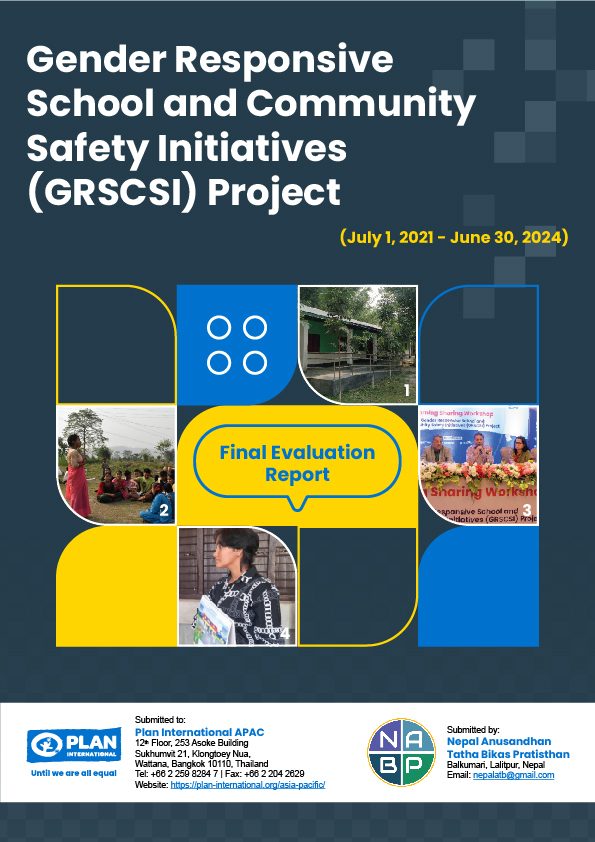Gender Responsive School and Community Safety Initiatives Project
Final Evaluation Report
The Gender Responsive School and Community Safety Initiatives (GRSCSI) project, implemented by Plan International in Bangladesh and Nepal, aimed to create safer, gender-responsive educational environments to address the challenges posed by climate-induced disasters.

Project overview
The GRSCSI project, implemented by Plan International APAC, Bangladesh and Nepal, aimed to create safer, gender-responsive educational environments in both countries to address climate-induced disaster challenges. The project was operational from 1 June 2021 to 31 July 2024.
The project targeted 3 schools, including 1 madrasah and 4 communities in Bangladesh, reaching 3,362 girls and 4,986 boys, alongside 2,012 women and 2,942 men. The implementation areas included four wards of three Unions: Kachakatha, Kedar, and Ballaverkhash within the Nageshwari Sub-District of Kurigram District. The project was implemented in partnership with NGO partner, Eco-Social Development Organization.
In Nepal, the project was implemented in 8 schools across Dudhauli Municipality and Marin Rural Municipality in Sindhuli District. It reached out to 7,080 individuals including 1,171 girls, 1,125 boys, 2,389 females and 2,395 males from 8 schools and 24 communities surrounding the schools. The project was implemented in partnership with an NGO partner, HANDS Nepal.
Plan International APAC coordinated the regional component implementation and supported knowledge management, strengthening school safety programming in the Asia Pacific through the APAC Safe School Task Force. At the same time, the Plan International Bangladesh and Nepal country offices were responsible for the project implementation. Plan International Japan funded the project.
Project outcomes
Plan International Bangladesh and Nepal COs are both highly susceptible to climate-induced disasters, which impose a significant strain on public resources and exacerbate hardships for historically marginalised groups. The entrenched patriarchal social structure in both countries further compounds the vulnerability of specific segments of society, particularly girls, women, boys, PwDs and intersex individuals, making them disproportionately affected by the frequent occurrence of such disasters. In this connection, the project aimed to achieve a gender-transformative, safer educational environment at both school and community levels, addressing multiple hazards through three following primary outcomes:
- Outcome 1: Enhancing the safety and gender responsiveness of school environments in alignment with the Comprehensive School Safety framework.
- Outcome 2: Strengthening community disaster risk management capacities in a gender-responsive, inclusive manner integrated with school preparedness initiatives.
- Outcome 3: Promoting gender-responsive safe school initiatives at various levels of governance, collaborating with government and civil society partners.
This report documents the findings of the final evaluation of the GRSCSI project. The final evaluation was conducted over the period of April – June 2024 in selected project supported schools and their surrounding areas in Bangladesh and Nepal
Download the GRSCSI project final evaluation report here:
Final Evaluation Report
771 kb
Categories: Emergencies


